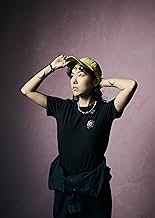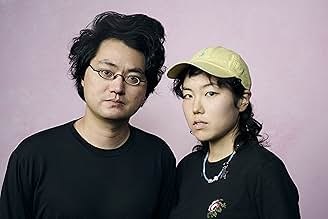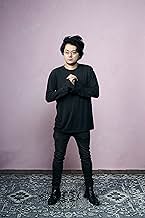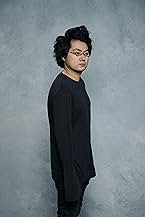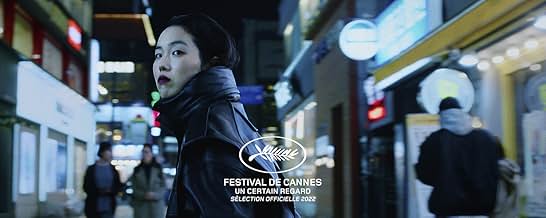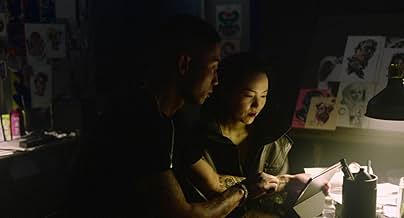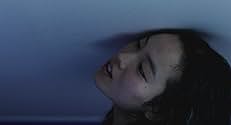IMDb-BEWERTUNG
6,9/10
9966
IHRE BEWERTUNG
Eine Französin kehrt zum ersten Mal nach Korea zurück - dem Land, in dem sie geboren wurde, bevor sie von einem französischen Paar adoptiert wurde. Sie beschließt, ihre leiblichen Eltern aus... Alles lesenEine Französin kehrt zum ersten Mal nach Korea zurück - dem Land, in dem sie geboren wurde, bevor sie von einem französischen Paar adoptiert wurde. Sie beschließt, ihre leiblichen Eltern ausfindig zu machen.Eine Französin kehrt zum ersten Mal nach Korea zurück - dem Land, in dem sie geboren wurde, bevor sie von einem französischen Paar adoptiert wurde. Sie beschließt, ihre leiblichen Eltern ausfindig zu machen.
- Auszeichnungen
- 10 Gewinne & 25 Nominierungen insgesamt
Heo Jin
- Grandmother
- (as Jin Heo)
Régine Vial
- Gisèle Benoît
- (as Régine Vial Goldberg)
Shin Dong-ho
- Tena's Father
- (as Dong-ho Shin)
Empfohlene Bewertungen
Inspired by the life of Laure Badufle, the screen-writer, "Return To Seoul" takes us on a journey of regret, anger, sorrow and wondering what could have been. This film puts an exciting spin on the "adoptee wants to find their biological parents" genre with its depiction of all of the stages Freddie, the protagonist, goes through on her journey of reconciling with her biological parents and also finding her own identity. Davy Chou, the director, captures incredibly Freddie's stance on reuniting with her father, which shows that she is torn between wanting to meet him and being angry with him for giving her up in the first place - this ambivalence keeps the whole narrative thrilling in an otherwise slow pace/slow burn picture like this. What I must appreciate is the truly realistic approach to the legislative side of how adoptees can find their parents, that helps the film being believable. Also I completely admired the striking performance of Park Ji-min in the titular role and I couldn't believe that this was actually her first film ever.
Return to Seoul is a captivating film that presents an intimate and complex portrayal of Freddie, although the larger context of her life is missing. However, the film's commitment to staying in the moment keeps the audience engaged. While the film does not have a strong emotional impact, it remains focused on Freddie's search for her identity and origins. Nevertheless, the movie lacks originality and does not distinguish itself from other films with similar themes. Despite this, Return to Seoul is still a well-made film that provides a compelling character portrait, albeit with some rambling sequences that do not add much to the story.
Return to Seoul: A stranger in a strange land, adopted as a bay from South Korea and raised in France, 25 year old Freddie (Ji-Min Park) returns. It is a bit of a culture shock but she quickly makes friends. She is persuaded to contact her birth parents through the adoption agency and eventually her father responds. All does not go swimmingly especially as Freddie's free spirit clashes with Korean reticence and patriarchal norms. Freddie herself however is self-centred and even cruel to friends and family. The film captures snapshots her life for her first two weeks as an returnee in Korea, two years later, five years after that and finally a year later, eight years since her first return visit. She develops in some ways, degenerates in others. An interesting tale of loss, acceptance, search for identity and longing on the part of Freddie. Directed and written by Davy Chou. 8/10.
As an audience member, films that cover the topic of adoption, there are expected themes of identity involved. But instead we get more of a random style of set-pieces within the conventional moments that represented identity in a unique way.
For the most part, it worked for the character and the story. But there were some that I just couldn't get on board with and some were even so random they were unforgivable.
I really liked Park Ji-Min's performance. I enjoyed the attitude that she gave to the leading character and the spontaneous moments that she orchestrated were largely memorable and one of the strongest parts of the film.
I liked the overall look. It was able to give us some effective imagery in different environments and never feel like different films.
The pacing was gentle. There were some purposeful lingering shots which worked well for the most part. Also, the camerawork was respectful with its wide shots as it let the pictures do the talking instead of taking over and turning it into something that wasn't intended.
As mentioned, I wasn't invested with every decision made. Some of the choices in the narrative in the second half made no sense to me. There were others I appreciated, but just wasn't a fan of them.
Despite that, I thought this was still a good enough drama that was worth my time. It's got a solid leading performance that you're willing to invest in. It also poses some interesting representations on the themes of identity that I've not seen before.
I cannot forgive some of the random moments in the second half. But nevertheless, there was enough engrossing moments to keep me guessing how this would end.
For the most part, it worked for the character and the story. But there were some that I just couldn't get on board with and some were even so random they were unforgivable.
I really liked Park Ji-Min's performance. I enjoyed the attitude that she gave to the leading character and the spontaneous moments that she orchestrated were largely memorable and one of the strongest parts of the film.
I liked the overall look. It was able to give us some effective imagery in different environments and never feel like different films.
The pacing was gentle. There were some purposeful lingering shots which worked well for the most part. Also, the camerawork was respectful with its wide shots as it let the pictures do the talking instead of taking over and turning it into something that wasn't intended.
As mentioned, I wasn't invested with every decision made. Some of the choices in the narrative in the second half made no sense to me. There were others I appreciated, but just wasn't a fan of them.
Despite that, I thought this was still a good enough drama that was worth my time. It's got a solid leading performance that you're willing to invest in. It also poses some interesting representations on the themes of identity that I've not seen before.
I cannot forgive some of the random moments in the second half. But nevertheless, there was enough engrossing moments to keep me guessing how this would end.
I could not watch this film without any expectation or prejudice, as I know someone who has a sibling that is an adopted Korean child. However I still tried to keep an open mind, and I think the film is executed well.
Freddie is the only character that is really fleshed out and I think that's right. There are several other characters, notably Freddie's father, that are treated with respect by the film but they are not given a lot of depth. But since it's not their story that is being told they all have to take a back seat to the little girl that it's all about.
After watching this I did a little digging and I found that adoption, foreign or not, is culturally, politically and therefore historically laden in South Korea. You have to want to go looking for it as the film does not push the subject too heavily, but it certainly has several scenes referring to this subject from the institutional rather than the personal viewpoint.
I do think the film has some problems in finding the right tone and there are segments that do not help progress the story. The whole birthday party segment might be nicely shot but does not really add anything.
All in all it's a good film and it triggered me to learning a bit more about its subject matter.
Freddie is the only character that is really fleshed out and I think that's right. There are several other characters, notably Freddie's father, that are treated with respect by the film but they are not given a lot of depth. But since it's not their story that is being told they all have to take a back seat to the little girl that it's all about.
After watching this I did a little digging and I found that adoption, foreign or not, is culturally, politically and therefore historically laden in South Korea. You have to want to go looking for it as the film does not push the subject too heavily, but it certainly has several scenes referring to this subject from the institutional rather than the personal viewpoint.
I do think the film has some problems in finding the right tone and there are segments that do not help progress the story. The whole birthday party segment might be nicely shot but does not really add anything.
All in all it's a good film and it triggered me to learning a bit more about its subject matter.
Wusstest du schon
- WissenswertesThe movie is based on the life of Laure Badufle, a friend of director Davy Chou. Like Freddie, she was born in South Korea, stayed a year there before being adopted in France. At age 23, she came back and lived for two years there before returning to France. A few years after that, Chou accompanied her to South Korea, when they met her biological father and grandmother. According to him, the meeting was full of emotions, of regret and bad communication, with the translator struggling to convey Badufle's anger into polite Korean.
- SoundtracksPetals
Written by Shin Jung-Hyun
Performed by Lee Junh-Hwa
Top-Auswahl
Melde dich zum Bewerten an und greife auf die Watchlist für personalisierte Empfehlungen zu.
- How long is Return to Seoul?Powered by Alexa
Details
- Erscheinungsdatum
- Herkunftsländer
- Offizieller Standort
- Sprachen
- Auch bekannt als
- Ohne Rückkehr
- Drehorte
- Produktionsfirmen
- Weitere beteiligte Unternehmen bei IMDbPro anzeigen
Box Office
- Budget
- 2.200.000 € (geschätzt)
- Bruttoertrag in den USA und Kanada
- 798.774 $
- Eröffnungswochenende in den USA und in Kanada
- 27.315 $
- 19. Feb. 2023
- Weltweiter Bruttoertrag
- 2.175.376 $
- Laufzeit1 Stunde 59 Minuten
- Farbe
- Seitenverhältnis
- 1.85 : 1
Zu dieser Seite beitragen
Bearbeitung vorschlagen oder fehlenden Inhalt hinzufügen





